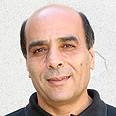
'Laws won't help get rid of Arabs'
'Star' of one of most important court rulings in recent years forbidding discrimination against Arabs wishing to live in Jewish communities, believes that reception committee law is unnecessary. 'No secular person would ask to live in Kfar Chabad'
A decade after thigh High Court of Justice ruled that selling lands solely to Jews is illegal, the "star" of the case and the appellant who protested against being prevented from purchasing a home in the Katzir community because he was an Arab, is still living in Baqa al-Gharbiyye.
Ahead of the expected approval of the reception committee law in the Knesset on Monday, which some claim was meant to get around the famous ruling, a smiling Adel Kaadan makes it clear that it is only technical issues that have stopped him from moving to his new home, over which he conducted one of the state's most important legal battles in recent years.
The law gives reception committees in rural communities including moshavim, kibbutzim and communal settlements the authority to accept or reject candidates seeking to become residents according to criteria they decide in advance in keeping with certain limitations and restrictions that are mentioned in the law.
"There are a few more things to finish," Kaadan explained; excited over the move to his new house with his wife Iman. "There is a problem with the tiling. This community is made up of a wonderful social fabric, the best people out there. Many of my neighbors still work with me and the rest treat me like a friend."
While initiators insist that the new law is actually compatible with the spirit of the ruling in Kaadan's case and forbids screening candidates seeking to join communal settlements due to considerations of religion and race, Kaadan expresses great doubts over the true goals behind the move.
"I don't know what the law's initiators intend. There are enough learned people, including some High Court judges who have already given their opinion on the matter. And he who adds, destroys."
Kaadan's response to one of the law's initiators, MK David Rotem (Yisrael Beiteinu) who said that "a racist was someone who tried to force his way into a community that doesn't suit him" was that unlike the mind set of the law's initiators – he had no hidden interests when he insisted to be allowed to live in Katzir.
"I just wanted to improve my quality of living. There are weak people who think that force can determine everything. Laws that try to find a way around high court rulings will be able to get rid of Arabs and prevent Arabs from integration? I believe the reality is different", Kaadan explained.
"People know their place which is why no secular person would ever ask to live in Kfar Chabad, just as an illiterate would never ask to move to a community of professors. In most cases those wishing to live in those places are people like you or me."
'In a few years they will be sorry'
MK Rotem's publicly expressed concern that Arabs would storm rural villages and demand to make their homes there doesn't fit with what Kaadan sees as reality today. "We didn't see a mass exodus of Arabs seeking to live in Jewish communities after my case."
Kaadan noted that in his eyes, "the better the treatment the more homogenous the social fabric. It is something that seems to fix itself and there is no need to create so many laws I order to try and bring about social change.
"Society must go through a process. I am proud of this country and its democracy but not of the people who have adopted use of force as their methods for achieving things."
Kaadan prefers not to give an unequivocal response to the question of whether there is room for the law or not. He leaves that decision to the test of time and meanwhile – asks the law initiators to look in the mirror.
"Will a law like this make us look like a country that employs racist methods, or should previous laws be revoked in order to promote fellowship? I believe that in a few years they will be sorry."
- Follow Ynetnews on Facebook










